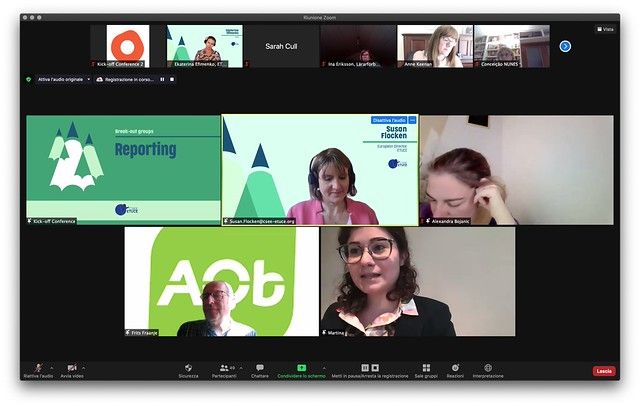
Kick-off Conference on the role of education trade unions in addressing environmental sustainability
On 22-23 April 2021, the ETUCE kick-off Conference “ Education Trade Unions addressing Sustainable Environmental Development”, brought together more than 60 trade union representatives from all across Europe. The event marked the inauguration of the ground-breaking ETUCE project on “ Education for Social Change: The role of Education Trade Unions in addressing sustainable environmental development”. Within the two-day event, education trade unions discussed the current practices and policies related to addressing the environmental issues and sustainable development in education at the national and European level. The Conference was also the occasion to share the challenges faced by education trade unions when dealing with education for environmental sustainability and the impact of climate change on the education sector and education personnel.
During the Conference, while presenting various EU initiatives on Education for a Green Future, Ulrike Pisiotis, as representative of the EU Commission, pledged that the forthcoming proposals for a ‘ Council Recommendation on education for environmental sustainability’ and the ‘European competence framework on climate change and sustainable development’ will entail central attention to the role of teachers and education personnel. Moreover, Ms Tatiana Brabauskiene, a representative from the Workers’ group of the European Economic and Social Committee (EESC), presented the recent opinion “ Towards an EU strategy for enhancing green skills and competences for all” which calls to make environmental responsibility a transversal competence within education and training and the European Education Area.
In a fruitful plenary discussion, education trade unions discussed various national approaches to addressing environmental sustainability in education. They highlighted the wide variety among countries, the fragmented implementation and the severe lack of teacher training on the topic, as well as the lack of time within the curricula and the working schedules of education personnel to address environmental sustainability. Participants had an opportunity to learn more in-depth about the situation in Portugal, Norway and Belgium and about the involvement of national trade unions in the integration of education for environmental sustainability.

On the second day, participants discussed the potential of education trade unions to lead the needed social change for addressing environmental sustainability in education. They shared their unions’ experience and challenges in that regard. The discussion was kicked off by the speakers from Education International (EI) and the European Trade Union Confederation (ETUC) who highlighted the crucial role of education trade unions and social dialogue in addressing environmental sustainability. ETUCE member organisations from the UK and Denmark presented the union practices to address environmental education and sustainable development. These include the creation of a Green Committee within the union and the approval of policy guidelines, providing training for union affiliates, and building capacity for collective bargaining.
ETUCE member organisations underlined the need to define a common understanding and goals in relation to climate change and environmental education, as well as the importance to integrate environmental education transversally in the curricula. Moreover, education trade unions highlighted the need to advocate for the inclusion of environmental sustainability within social dialogue at national and European level and collective bargaining.
Based on the outcomes of the kick-off Conference, ETUCE will launch an online survey to identify the impact of environmental sustainability and climate change on the education sector and education workers in different national and local contexts in Europe, as well as to examine the role of education trade unions in addressing it as a social partner in education.
Read more:
- ETUCE project “ Education for Social Change: The role of Education trade unions in addressing sustainable environmental development”
- Presentations DAY 1 HERE
- Presentations DAY 2 HERE
- Read the Conference Report